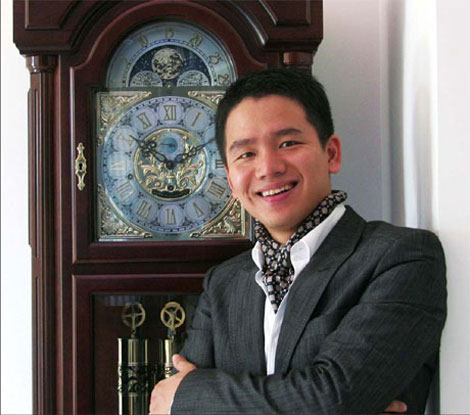Generation gaps
Updated: 2011-04-01 10:56
By Yu Ran (China Daily European Weekly)
 |
|
Jin Feipeng has transformed his family's company Jiu Ding Clock from an OEM to a top brand after taking over six years ago. Provided to China Daily |
Zhejiang's first generation of entrepreneurs search for their successors
Li Rucheng has spent 20 years establishing his company, Youngor, one of the largest garment manufacturers in Ningbo, in East China's Zhejiang province. Working his way up at the Youth Garment Factory as a laborer hauling bricks in a wagon and finally to being the director of the factory, Li earned enough management experience before launching Youngor in 1990. But Li, like many of Zhejiang's famed entrepreneurs who have built companies and businesses at unparalleled acceleration, is quickly approaching retirement age and faces possibly one of his biggest challenges yet: when does he let someone else take over?
"It's not a problem of who," says 60-year-old Li. "We all want to pass our businesses to our children, but it's a matter of when."
Management experts say that there are no precedents to the growth China has seen in its modern private enterprise sector in the past 30 years, which makes passing on businesses to younger generations that much more tricky. Many local entrepreneurs are not sure if their Western-educated children can cope with China and Zhejiang's unique style of development.
Youngor is a prime example. The company, with total assets valued at about 60 billion yuan (6.48 billion euros), reflects Li's personality in its management style, which Li calls the "Youngor spirit".
"Although I only have an 8.5 percent of the holdings of my company, I still have to consider and choose the next generation carefully to ensure that they're able to inherit the Youngor spirit," Li says.
The lack of abilities and experience among the next generation is the biggest worry for this aging group of entrepreneurs, as their actions will immediately and directly affect the normal operation of the enterprises.
"The next five to 10 years will be the peak period of passing on family enterprises and the potential recession of the private sector in Zhejiang," says Mao Lixiang, the founder of Ningbo Fotike Kitchen Ware Co Ltd.
Mao says that for more than 90 percent of private family enterprises, how the next generation handles the businesses will greatly influence the development of the province's private sector.
One solution to the problem is educating younger generations abroad or enrolling in Executive Master of Business Administration (EMBA) programs.
In an era of intense economic competition, EMBA programs emphasize the need for business people to also serve the broader social good, as social stability and national prosperity depend on entrepreneurs' willingness to sacrifice some of their personal desires for the betterment of society.
The EMBA at the Cheung Kong Graduate School of Business is well known for its team-oriented culture by encouraging frank and honest exchanges of ideas and opinions, promoting camaraderie and the development of life-long friendships.
Tuition costs for the 20-month program for classes that began last September was 568,000 yuan. The Cheung Kong EMBA course targets young management leaders in decision-making roles at corporate businesses who display leadership potential. The classes meet once a month on a four-day weekend, minimally interrupting a regular work schedule.
Teng Binsheng, associate professor of Strategic Management at Cheung Kong, says that while the EMBA courses help potential leaders realize their roles in management and guides them to run companies confidently, it probably can't completely quell doubts of those who have dedicated their lives building these businesses.
Teng says there are hidden conflicts between the two generations, like trust issues and contrasting personalities.
In a study by HSBC and other consulting agencies last year, about 70 percent of these second generation bosses fail to transform and expand family businesses.
Teng attributes conflicts between first generation shareholders and second-generation successors to the slowed development of companies.
Compared to taking short-term EMBA course in China, studying and working abroad can give this next generation more experience, confidence and independence.
"Recruiting applicants who are internationally educated or have a work history abroad will reinforce local private enterprises to refocus their direction and add a potential boost to development," says He Xiaogang, a professor at School of International Business Administration at Shanghai University of Finance and Economics.
Becoming a successful businessman is Jin Feipeng's ultimate goal. This 29-year-old Wenzhou native has transformed his family's company from an OEM manufacturer to a top brand in the clock industry after taking over the business six years ago.
Jin graduated from Thames Valley University in London, where he first got the entrepreneurial bug when he started selling DVDs at a weekend market in London when he was only 17 years old.
"I wanted to earn and spend my own money instead of asking my parents," Jin says.
Jin sold bags, accessories and commodities during the first year, then became a second-hand landlord by renting two rooms to other students in the house where he lived.
"I've worked in a lot of places, including bars and restaurants, during my four-year stay in the United Kingdom, and I kept my business mind working non-stop," Jin says.
Jin returned to China and took over his father's 10-year-old clock company in 2005, when Jiu Ding was just an original equipment manufacturer (OEM) for clock replacements and clocks owned by international brands.
After taking over the company, Jin realized that the company should not solely operate as an OEM. So he started building the Jiu Ding brand to manufacture high-end clocks domestically.
"I've successfully made 85 percent of our products to meet the demands in the domestic market and Jiu Ding, as a Chinese brand, is progressing to become an international brand," Jin says.
Jin has not only changed the production line, he's shaken up the staff as well. He's hired a team of experts to invent an efficient industrial microwave technology to improve the drying process of the solid wood applied to the clocks.
"Our team has managed to shorten the time of drying from 48 hours to 6 hours with a more effective drying result, " Jin says.
Jiu Ding Clock has products being sold at more than 200 clock stores in China, has merged with a German clock brand and is authorized to sell three brands from the United States, Germany and Japan in China.
"My aim is to develop Jiu Ding from a single brand to a multi-brand company and from a manufacture based enterprise to a trading and service concentrated enterprise," Jin says. "Then I want Jiu Ding to open an independent store."
Shi Jing contributed to this story.
E-paper

Green mission
Tony blair believes China will take a leading role to fight climate change and cut emissions.
Stepping on to success
French connection
Generation gaps
Specials

Have you any wool?
The new stars of Chinese animation are edging out old childhood icons like Mickey Mouse and Hello Kitty.

Fill dad's shoes
Daughter and son are beginning to take over the family business of making shoes.

Virtual memorial
High-Tech touches to traditional tombsweeping festival help environment.
